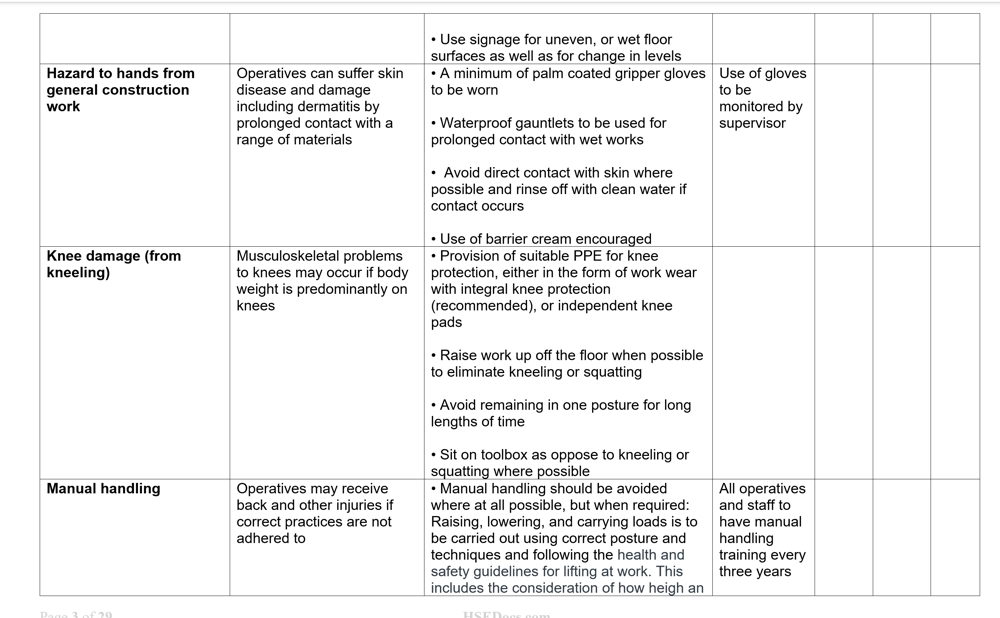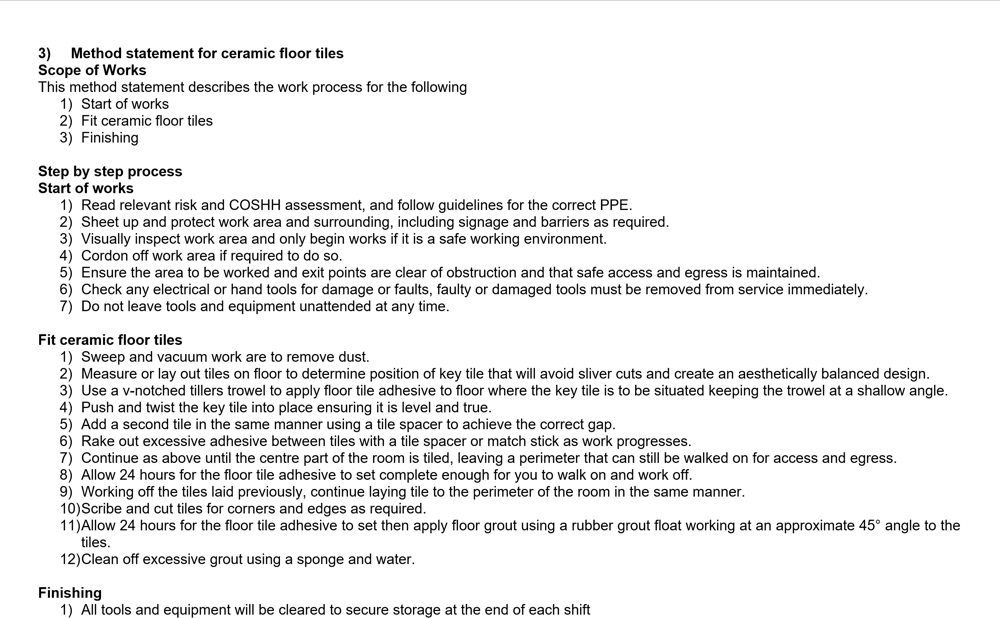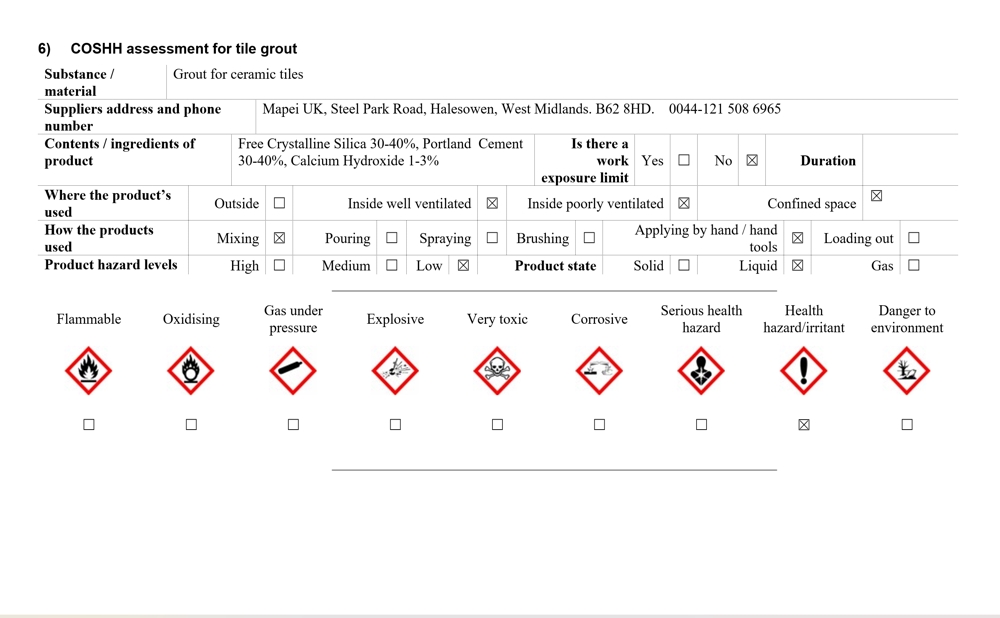Ceramic Tilers health and safety RAMs pack. BEST OFFER

Kitchens, bathrooms, saunas or swimming pools. These are the RAMS you need. A complete H&S package for just £35.00
 |
 |
 |
|
Sample 1 |
Sample 2 |
Sample 3 |
Ceramic tilers specialise in installing tiles on floors, walls, and various other surfaces in residential and commercial environments. Their role encompasses several key tasks that require a keen eye for detail and a high level of craftsmanship.
Initially, tilers prepare the surfaces by levelling them appropriately using materials such as plaster, sand, or cement. This foundational step is critical, ensuring a smooth and even base on which the tiles will be laid, preventing future complications such as uneven surfaces or cracks.
Next, tilers proceed with precise measurements of the installation area, utilising measuring tapes and laser levels to determine the exact number of tiles required. They then cut the tiles to size and shape, employing manual hand-cutters and electric power tools like wet saws. This cutting process demands skill and accuracy to achieve clean edges and fit tiles snugly around corners or obstacles.
Once the tiles are prepared, tilers apply specialised adhesive or mortar to both the back of the tiles and the surface being tiled. This dual application ensures a secure bond that withstands the test of time. Tilers carefully lay the tiles in the desired pattern and spacing, using tools such as tile spacers and levels to maintain alignment and achieve a uniform appearance throughout the installation.
Completing the tile installation involves grouting, the process where tilers fill the joints between tiles with a mixture of grout to enhance stability and create a finished look. At this stage, they may also apply sealants to protect the tiles from moisture penetration and staining, significantly extending the longevity of the installation.
After the installation, tilers take pride in cleaning up the workspace, meticulously removing any leftover debris, dust, or excess grout. The final surface is then inspected to guarantee a neat, professional finish that meets the highest standards of quality and aesthetics. With their expertise, tilers transform spaces with precision, bringing both functionality and beauty to their projects.
Table of contents for ceramic tiling package
Risk assessments for:
- 01) Ceramic tiling
- 02) Risk awareness for areas where asbestos could potentially be discovered
Method statements for:
- 03) Ceramic floor tiles
- 04) Ceramic wall tiles
COSHH assessments for:
- 05) Tile adhesive
- 06) Tile Grout
- 07) Latex screed
- 08) Silicone sealant
This H&S pack has been put together based on our professional experience and our customers' download trends, and buying this package allows you to display the "Health & Safety Gold Standard Award" on your website. Letting clients, customers and contractors know that your H&S is current and up to date. Not only will your RAMS be current and up to date, but they will stay that way because as H&S changes, we update this ceramic tilers package to reflect new trends and laws. You buy the ceramic tilers H&S package once, and it's yours for life to download as often as you need, and each download will always have the most up-to-date RAMs.
Purchasing these documents as a package rather than acquiring them individually can save over £35.00 on the listed price. You can get these documents today at a better than half-price deal. At HSEDocs, we understand that value is not just about saving money but also about getting a high-quality product at the right price to help you win tenders and stay up-to-date with your health and safety requirements. All our documents, including this one, are available in docx format, making it easy to open and edit in Word™ or any other word processor. Add your company details to the document's first page, and it will be ready to use.
This document is:
- Recognised by local authorities.
- Recognised by principal contractors.
- Suitable for CDM sites.
- Approved by H&S managers.
Our customer's feedback is a testimony to the value of our products.
Ceramic is notoriously sharp when it breaks, creating a higher risk than most of the construction industry of cuts and grazes to hands. Additionally, when a tile is snapped or cut, sharp pieces of ceramic can be ejected, posing a hazard of strike wounds to the eyes and face.
Falls from height, usually involving step ladders, tool boxes, or hop-ups, are a common accident, as are same-level slips, trips, and falls, particularly if the floor becomes wet.
Electric shocks are a high-risk factor if work is carried out without isolating the supply, and even if a supply has been isolated, cables may come loose when fitting tiles behind switches and sockets.
Manual handling, repetitive work, and working in a confined space can cause musculoskeletal injuries, and occupational hazards such as getting tile adhesive on the skin can cause diseases such as dermatitis.
Accidental asbestos disturbance is always a risk in properties constructed before 2000 and can cause cancer and other diseases.
Legally, a company must have risk assessments for their tasks and COSHH assessments for products they use. Additionally, they must have a company Health and Safety policy if they employ more than four staff members.
However, principal contractors and CDM sites often require more documentation from their subcontractors. This may include method statements, equality and diversity policies, training records, lone worker policies, and PAT test records.
Generally, you will not need more than a company Health and Safety policy and the documents in this package for most of your work.
A complete list of the contents of this document is available by scrolling down.
Even experienced ceramic tilers still need regular training. Most principal contractors are happy with online training, especially for slips, trips, and falls, manual handling, working at height, and asbestos awareness. These online courses are convenient for employers as staff can take them on their devices at a time and place that suits them. Sometimes, the most important training is about site rules and conditions. Therefore, it's crucial to ensure that the staff on a specific site know all the site rules and what's expected of them.
GET THIS DOCUMENT
£35.00+VAT
- Available in Word™
- Fully customisable
- Add your Company Logo
- UK & EU Compliant

 CART
CART 